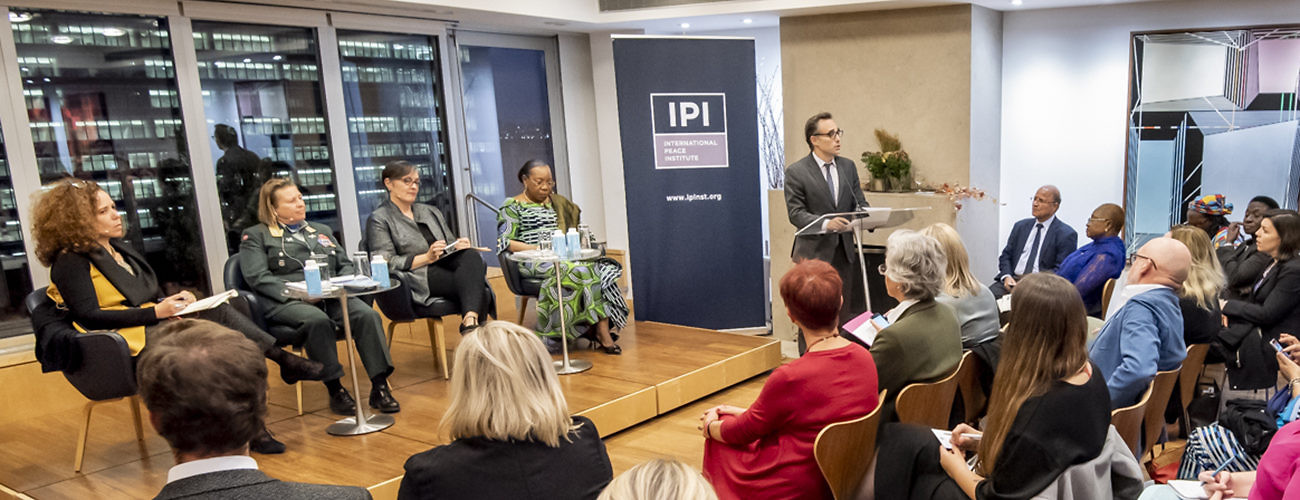The year 2020 will mark the 20th anniversary of United Nations Security Council Resolution 1325 on Women, Peace, and Security (WPS). Despite two decades of WPS policy development and commitments, women’s meaningful participation at all decision-making levels lags due to structural barriers, lack of access to political arenas, and even threats to women who attempt to participate in these processes. In efforts to build and sustain peace, there remains a widespread neglect for the expertise of local-level women peacebuilders, and formal peacemaking efforts continue to be resistant to women’s meaningful participation and to women’s rights.
To address these barriers, governments and the UN have recently been taking steps at the national and regional levels on women’s leadership, including by launching networks of women mediators and leaders. An October 24th evening reception at IPI brought together researchers, policy makers, and practitioners to discuss the potential of the WPS agenda, as well as existing challenges and ways to address them.
The event was co-hosted with the Permanent Mission of Norway to the UN, the Crisis Management Initiative (CMI), and the Inclusive Peace & Transition Initiative (IPTI). It drew on the insights of participating women peacebuilders, and IPTI and IPI research. The discussion shed light on various initiatives at the national, regional, and international levels, and surfaced questions and issues for member states, the UN, and NGOs to consider as their work continues.
In opening remarks, Adam Lupel, IPI Vice President, noted that “women must be at the center of all peace efforts at large. We must recognize that this is not just a matter of developing policy and making formal commitments; it is about recognizing the structural barriers to participation and about taking action to remove them.”
Despite the remaining barriers to achieving the WPS agenda by 2020, Mari Skåre, Deputy Permanent Representative, Permanent Mission of Norway to the UN, highlighted the importance of the progress the agenda had made so far. “Yes, there remain real hindrances for women’s participation, and yes, discrimination against women is one of the key hindrances we need to tackle,” she said. “I would like to say to you that we are transforming our societies: it’s not a matter of when or if we are doing it; we are doing it now. We see progress as a result of this work.” She emphasized that, “We need your leadership, your competence, to keep us accountable.”
Speaking from experience, Cathérine Samba-Panza, Co-Chair of the Network of African Women in Conflict Prevention and Mediation (FemWise), and the former president of the Central African Republic, said that when “faced with conflict, women are indeed in the first line.” She continued, stating that women are often “the first victims, and they know all the challenges, difficulties, and implications of the conflict.” But when it comes time for peace talks, and you look at the table, “They are not there.”
“Everywhere around the world, women have decided that they will no longer stay at this level as victims, they want to be around the table,” she said. “It’s not just about wanting to be at the table but wanting to bring solutions; and their voice is not heard; it is not taken into account.”
She said that in her country, “Women are brought to speak with armed groups to see what their grievances are and to try to address them. But when we arrive at the moment of peace talks, the women are no longer present.” She said that among political figures, armed groups, and militia leaders, she saw no women.
Norwegian Major General Kristin Lund, Head of Mission and Chief of Staff of the United Nations Truce Supervision, made reference to the value of networks of women mediators, saying that “the military are often the first responders, and it’s a tool that I think [mediator networks are] so important…That’s why I think education of our military leaders is very important.”
She reflected on her experience as the first female Force Commander of a UN peacekeeping operation. “I’ve been fighting all my life to go through that glass ceiling and when you get through, you have to make sure you inspire other women,” she said. “Now when I travel, gender is on the agenda.”
Thania Paffenholz, Director of the Inclusive Peace & Transition Initiative, asked about “how we can use our roles as women and learn in a positive transformative way.” She made note of the limitations of using quotas. “If you put a quota, you will not necessarily get feminists in,” she said, “There’s a danger that we are just changing the players and not the game. If we just add women and the system doesn’t change, we will not change.”
Moderator and IPI Research Fellow Sarah Taylor concluded by echoing a point from the day’s meeting of women mediators: “Adding women to a broken process does not fix a broken process,” she said. “The point is to try to fix the system and not to fix the women.”








